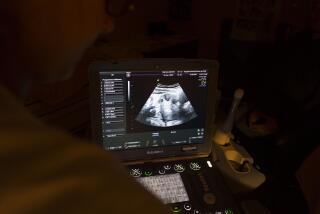Medi-Cal Offers Norplant Birth Control
- Share via
SACRAMENTO — The controversial Norplant birth control device is available to the poor through the Medi-Cal program and family planning clinics that contract with the state, Health Services Director Molly Joel Coye announced Friday.
More than 1 million low-income women are eligible to get the implant for free or at subsidized rates of up to $62, Coye said. The state has budgeted $5 million to provide the device to 10,000 women a year, the expected demand.
“Norplant will now join the range of options these women have for planning the growth of their families,” Coye said.
Coye said the state has reached agreement with Wyeth-Ayerst Laboratories of Philadelphia to obtain the implants and to provide free training for physicians and nurse practitioners who will insert them.
Norplant consists of six 1-inch-long tubes that are implanted in a woman’s upper arm in an office procedure that takes less than half an hour. The tubes release the hormone levonorgestrel, which inhibits ovulation.
The device works for five years. Its effects disappear soon after the implant is removed.
The department’s action fulfills Gov. Pete Wilson’s pledge a year ago to make the device available to poor women. Wilson hopes that the implant’s high success rate and the ease with which it works will help low-income women prevent unwanted pregnancies, thus saving the state money that goes for increased welfare benefits and medical care.
The device has been controversial because it is implantable and, unlike some other birth control methods on the market, could be forced on women by those intending to prevent them from becoming pregnant.
A Visalia judge gave a woman convicted of child abuse the choice of jail or probation on condition that she accept an implant. Wilson has considered forcing drug-abusing women of childbearing age to have the implant.
But Coye said Friday that the state does not intend to force anyone to use Norplant. Norma Clevenger, executive director of Planned Parenthood Affiliates of California, the state’s largest family planning contractor, said her organization shares that view.
“We will be ever vigilant that this is a device not used coercively in any way,” Clevenger said.
Clevenger, Coye and others said they do not expect the device to be widely used by teen-age girls. They said the implant probably will be used more by older women who are seeking an alternative to having their tubes tied and might be more motivated to accept Norplant’s side effects----which can include acne, headaches and irregular menstrual bleeding.
Tests on Norplant have found that it is more effective than any birth control method other than male sterilization. Only 0.2%--or 2 out of every 1,000--women using the device would be expected to get pregnant in the first year.
This compares with 0.1% for male sterilization, 0.2% for female sterilization, less than 1% for oral contraceptives and intrauterine devices, and 2% for condoms.
“Norplant potentially is the most important contraceptive development in the past 30 years,” Coye said. “It is very important that this not be an option limited by the economic characteristics of women in California.”
About 850,000 women who qualify for Medi-Cal are eligible to receive the implant, most of them without charge, Coye said. Nearly 500,000 clients of the state-subsidized family planning clinics can get the device for a fee of up to $62, depending on their income.
Norplant sells commercially for about $350, but Coye said the Medi-Cal program will obtain it at a 12% discount.
More to Read
Sign up for Essential California
The most important California stories and recommendations in your inbox every morning.
You may occasionally receive promotional content from the Los Angeles Times.










